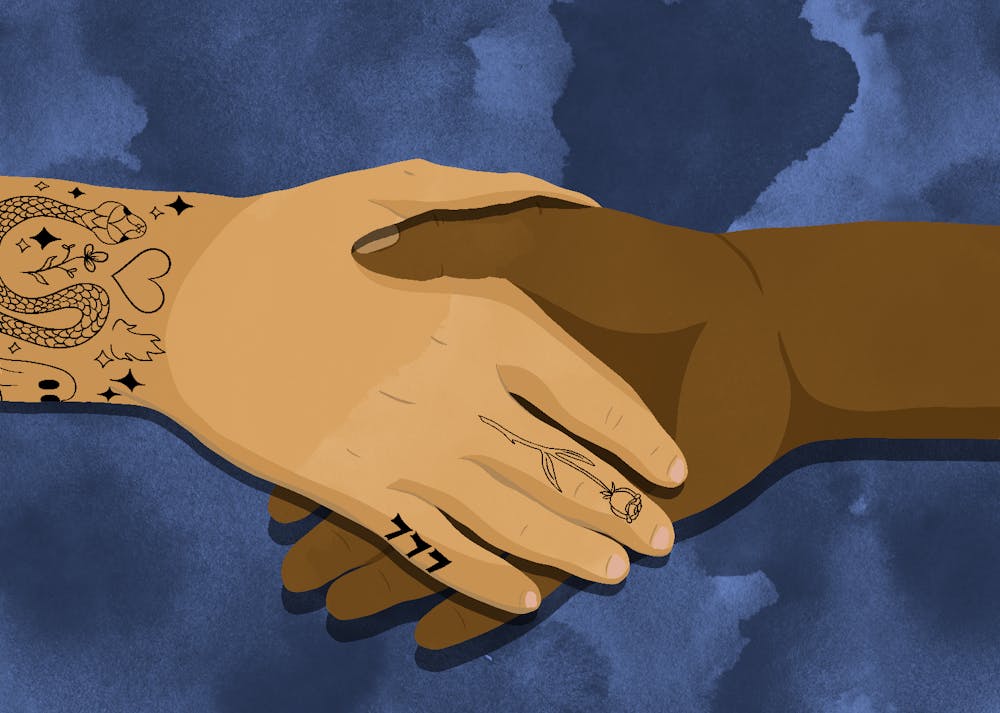Self-expression through tattoos has become mainstream for students as the professional environment becomes more accepting of body art. Through ink, students can share who they are without saying a word, and many are excited for the workforce as the once "taboo" practice becomes celebrated.
For students such as Chloe Fellers, a sophomore studying forensic science, tattoos are a meaningful way for self-expression.
"I have my grandfather's handwriting, I have stars from my friends," Fellers said. "I have things that mean a lot to me, and they keep me going and (at) times, they're rough, and that's what tattoos mean to me."
With over 30 tattoos, Fellers was excited about the opportunity to work for Disney World in the fall as it loosened restrictions regarding ink. Fellers mentioned from experience in her current job that tattoos are a great talking point with customers.
"I've had many people in my job and in public come up to me about my Disney tattoos and my snake tattoo on my back and compliment them and ask the story behind them," Fellers said. "So it's definitely a way to open line that communication."
Fellers said that more people accept tattoos in the professional setting after seeing many people continue their success with them.
"You can get a good job with tattoos; you can have tattoos and have a successful career," Fellers said. "The stigma that you can't do that is silly."
Fellers believes that as more people freely express themselves, there will be less stigmatization, especially in the modern day when tattoos are common. Fellers said tattoos will continue to be accepted in the workforce as long as they are not offensive or inappropriate.
"They will continue to be accepted to a certain extent; they have to be appropriate for the workplace," Fellers said. "I don't think that you can have an inappropriate tattoo or something that targets a group of individuals in a negative way."
Opening one of the first tattoo shops in downtown Tempe over 30 years ago, Mark Walters, Living Canvas Tattoos owner, has seen firsthand the change in perspectives of tattoos.
Walters said the neighborhood behind the shop tried to fight its opening, calling them "undesirables." Now, he serves clients from every background, including students, doctors and lawyers.
"We had to fight the city to even get in; now it's just everybody's tattooed," Walters said. "I see more people with tattoos than I don't."
Walters said a trend he witnessed in the '90s of celebrities and musicians getting tattoos helped destigmatize them as it became common for many people.
"It's just like everything; the more visible and the more OK society becomes with it, then the more people just do it, and people just become more accepting of it," Walters said.
Walters has even noticed a change in acceptance about where tattoos are put. He said hand and face tattoos have become more popular, a spot once reserved for heavily inked people or those within the industry.
Another veteran shop owner witnessed the culture change of tattoos. Sean Dowdell, Club Tattoo owner, said that tattoos are stigmatized because they came into the United States through underground rings in the 1800s.
"It just never really grew out of that until you started seeing it on TV and in magazines," Dowdell said.
Dowdell said about 40% of his clientele are ASU students. Currently, tattoo trends include fineline, handwriting and other small patchwork styles.
With tattoos becoming celebrated in workplaces across society, students may be inclined to get a tattoo. Both Walters and Dowdell stress research into the artist and the shop before agreeing to get a tattoo.
"Don't go to the cheapest place usually; you can't get the best and the cheapest in the same sentence," Dowdell said. "It's going to be on your body forever, so take the time and energy and look for good tattoo artists."
Tattoos have become valued by some because they are not material items.
"Tattooing is the one thing nobody can take away from you," Walters said. "You can get your car repoed, you can get your house foreclosed on. Material items can be taken, but your tattoos can't. They're always yours."
Edited by Katrina Michalak, Walker Smith and Grace Copperthite.
Reach the reporter at glmcfar1@asu.edu and follow @ginia_mcfarland on X.
Like The State Press on Facebook and follow @statepress on X.
Ginia is a junior studying journalism and mass communication with a minor in criminology. This is her third semester with The State Press. She has also worked at Arizona Capital Times and KTAR News.




